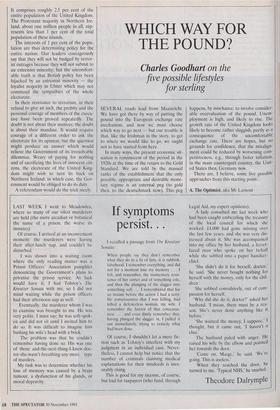If symptoms persist.. .
LAST WEEK I went to Meadowlea, where so many of our vilest murderers are held (the more arcadian or botanical the name of a prison, the worse its inmates).
Of course, I arrived at an inconvenient moment: the murderers were having their after-lunch nap, and couldn't be disturbed.
I was shown into a waiting room where the only reading matter was a Prison Officers' Association pamphlet denouncing the Government's plans to privatise the prison service. As luck would have it, I had Tolstoy's The Kreutzer Sonata with me, so I did not mind waiting while the prison officers had their afternoon nap as well.
Eventually, the murderer whom I was to examine was brought to me. He was very polite, I must say; he was soft-spok- en and did not sit until I invited him to do so. It was difficult to imagine him bashing his wife's head with a brick.
The problem was that he couldn't remember having done so. His was one of those and-the-next-thing-I-knew-doc- tor-she-wasn't-breathing-any-more type of murders.
My task was to determine whether his loss of memory was caused by a brain tumour, a dysfunction of his glands, or moral depravity.
I recalled a passage from /lie Kreutzer Sonata: When people say they don't remember what they do in a fit of fury, it is rubbish, falsehood. I remember everything, and did not for a moment lose my memory . . . I felt, and remember, the momentary resis- tance of her corset and of something esle, and then the plunging of the dagger into something soft .. . I remembered that for an instant before the action I had a terri- ble consciousness that I was killing, had killed a defenceless woman, my wife. I remember the horror of that conscious- ness . . . and even dimly remember that, having plunged the dagger in, I pulled it out immediately, trying to remedy what had been done.
Of course, I shouldn't let a mere fic- tion such as Tolstoy's interfere with my judgment in an individual case. Never- theless, I cannot help but notice that the number of criminals claiming medical explanations for their misdeeds is inex- orably rising.
This is good for my income, of course, but bad for taxpayers (who fund, through Legal Aid, my expert opinionS).
A lady consulted me last week who had been caught embezzling the treasury of the local council for which she worked. £4,000 had gone missing over the last few years, and she was very dis- tressed about it. She was accompanied into my office by her husband, a ferret- faced man who spoke on her behalf while she sobbed into a paper handker- chief.
`She didn't do it for herself, doctor,' he said. 'She never bought nothing for herself with the money, only for the chil- dren.'
She sobbed convulsively, out of com- passion for herself.
`Why did she do it, doctor?' asked her husband. '1 mean, there must be a rea- son. She's never done anything like it before.'
`She wanted the money, I suppose,' I thought, but it came out, 'I haven't a clue.'
The husband paled with anger. He raised his wife by the elbow and pointed her towards the door.
`Come on, Marge,' he said 'We're going. This is useless.' When they reached the door, he turned to me. 'Typical NHS,' he snarled.
Theodore Dalry mple










































































 Previous page
Previous page